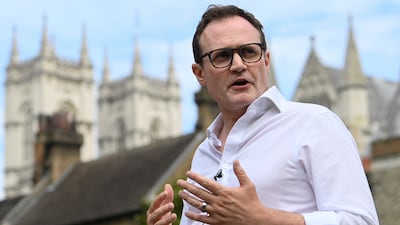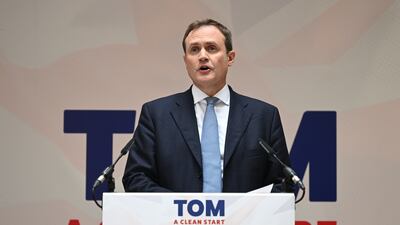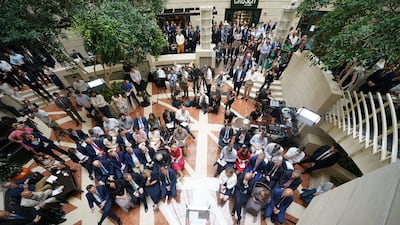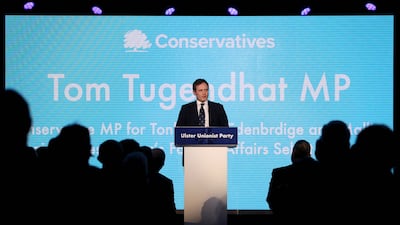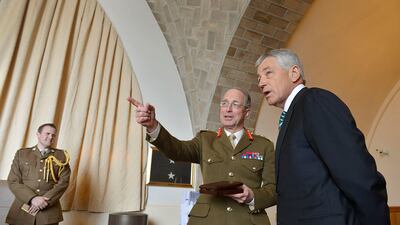Tom Tugendhat, the backbench MP who has made it to the shortlist to be the next Conservative leader, took a veiled swipe at front-runner Rishi Sunak's refusal to pledge an increase in defence spending.
It was announced on Tuesday evening that Mr Tugendhat, the Arabic-speaking army veteran who served in Iraq and Afghanistan, will join seven other contenders on the ballot paper as Tory MPs begin voting on Wednesday to elect a successor to Prime Minister Boris Johnson.
Mr Tugendhat has pledged to spend 3 per cent of gross domestic product — a measure of the size of the economy — on defence and security.
Under plans set out by Mr Johnson, the UK is set to spend 2.5 per cent by the end of the decade, well above the current Nato commitment of 2 per cent, but the issue has become an important factor in a Tory leadership race taking place while war rages between Russia and western-backed Ukraine.
While refusing to single out Mr Sunak by name, Mr Tugendhat was critical of the former chancellor's refusal to commit to an increased defence spending target but said the contest must not degenerate into “petty politics”.
He said it should be a “battle of ideas” rather than a “knife fight in a phone box”.
Former chancellor Mr Sunak said he viewed the Nato target as a “floor and not a ceiling” and noted that spending was set to rise to 2.5 per cent “over time”. He refused to put “arbitrary targets” on what he would spend as prime minister.
But Commons Foreign Affairs Committee chairman Mr Tugendhat told reporters at Westminster: “We will never put the safety of our country in doubt because of bean counters and spreadsheets.
“Security always comes before spreadsheets.”
Asked if he was taking aim at Mr Sunak, he said: “I’m not going to name any names, it’s absolutely up to you to look quite hard at where people are talking about different things and see where people are putting their targets.”
Mr Tugendhat insisted he was confident about his chances in the contest, with support from a range of opinions within the Tory party.
“I’m here to serve the country, I’m not here to serve anything else,” he said
“I’m here to bring a return of service to the United Kingdom – the government serving the people, the Conservative Party serving its members.
“Because this is not about petty politics, this is not some sort of a game. This isn’t just some sort of knife fight in a phone box.
“This is a battle of ideas that is actually going to determine the future of our country.”

In a 16-minute speech, the former army officer argued on Tuesday that he should become the next prime minister because Britain needs a leader with “a renewed sense of mission”.
Before politics, Mr Tugendhat gained extensive military experience serving operational tours in Iraq and Afghanistan between 2005 and 2009, as well as being an aide to the head of the British Army.
His speech was laced with military references, frequently using the word “retreat” when describing the state of Britain and Mr Johnson’s government.
“We have retreated into the pettiness of a politics that is more about personality than principle,” he said. “We have retreated into division when we desperately need unity. When the moment demanded service, we delivered scandal.
“I cannot accept retreat."
UK Conservatives on the leadership campaign trail - in pictures
Meanwhile, Mr Sunak has said that he would run the economy like Margaret Thatcher if he was elected as the next prime minister of the country.
The former chancellor told The Telegraph newspaper of his economic vision as he clashed with other contenders for refusing to promise immediate tax cuts.
“You have to earn what you spend,” he said in his first campaign interview.
Mr Sunak insisted that he would take a more responsible approach to tax cuts.
“We will cut taxes and we will do it responsibly," he said. "That’s my economic approach. I would describe it as common-sense Thatcherism. I believe that’s what she would have done.”
Mr Sunak also links Mrs Thatcher’s economic thinking with his own upbringing.
“If you read her speeches — and I’ve quoted her and [former Tory chancellor] Nigel Lawson in other lectures I’ve given — her approach to these things was to make sure that as a nation you have to earn what you spend.
“She talked about the person at home with their family budget. She talked about that really powerfully. That resonated with me, because that’s how I was brought up.
“My mum was a small businesswoman, she was a chemist. I worked in my mum’s small chemist in Southampton.
"I did my mum’s books, that was part of my job. I also did payroll and accounts every week and every month.”
